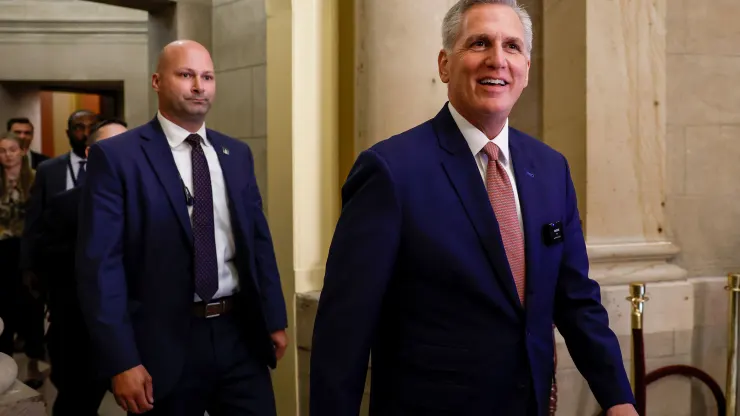A bill that raises the debt ceiling limit passed in the House by a wide margin late Wednesday. Now the bill is being sent to the Senate for a vote, just days before Monday’s U.S. default deadline.
The Fiscal Responsibility Act passed 314-117, with support from both Democrats and Republicans.
But not everyone is happy with the contents of the bill.
Wyoming’s lone Representative, Harriet Hageman, says she appreciates the hard work and diligence that Speak of the House Kevin McCarthy (and others) have put in to get the debt limit bill passed, but it’s not the comprehensive piece of legislation that she wanted.
“Where this bill falls short, and why I did not vote in favor of it, comes down to two key issues. First, I do not accept the current level of spending as a baseline for future spending. The spending caps established in H.R. 3746 are based upon recent appropriations and legislation, which have been greatly inflated over the past few years – in fact, 40% of all national debt was incurred while Nancy Pelosi was Speaker of the House. Second, I have been steadfast in my mission to rein in the administrative state, take power out of Washington, and return it to the people. H.R. 3746 provides more deference to agency bureaucrats to make new rules, with the cost of those rules placed on the backs of private businesses and individuals.”
Another key point that Rep. Hageman makes is she states that when she ran for Congress, she made a promise to listen to the concerns of people in the Cowboy State and be their voice in Congress. From what she has heard from constituents from across the state is that “spending and government overreach by bureaucrats” in DC are the biggest issues that have been voiced.
“Just this week, I received hundreds of calls and emails from constituents on this specific bill – and an overwhelming 95% have urged me to vote ‘no.’” Representative Hageman goes on to say in her press release, “[This piece of legislation] fails to significantly reduce our national debt and does not do enough to rein in the administrative state. We have very few opportunities and little time to gain control of the unsustainable debt facing our nation – it is imperative that raising the debt ceiling be coupled with more aggressive spending cuts and regulatory reform. I look forward to working with the Speaker and my fellow House Republicans to achieve deeper cuts and greater reforms through the appropriations process and with other legislation throughout the rest of the 118thCongress.”
The bill (and the gravity and drama that goes with it) now moves to the Democratic-controlled Senate, where leaders on both sides want it passed in 48 hours.
“Neither side got everything it wanted. That’s the responsibility of governing,” President Joe Biden said in a statement immediately after the vote. Biden thanked McCarthy for “negotiating in good faith,” and urged the Senate to pass the bill.
Treasury Secretary Janet Yellen has been warning Congress and the American people that federal funds could dry up in the coming days unless lawmakers raise the borrowing limit before next week.
If Congress would fail to raise the debt ceiling, the ramifications would be severe, upsetting global markets, spark job losses in the U.S. and jeopardize vital government benefits for millions of Americans. Yellen has called the would-be failure a potential “catastrophe,” but congressional leaders will need to win support for the bill in both chambers of a divided Congress.
Complicating things even more was a surprise finding from the nonpartisan Congressional Budget Office, which released its assessment late Tuesday of the bill’s impact on federal debt and deficits.
The CBO determined that the bill’s new work requirements for the Supplemental Nutrition Assistance Program (SNAP) would not save any money over 10 years, but would instead actually cost money, much to the consternation of Republicans intentions.
Why? Because in order to get the White House to agree to new work requirements for able-bodied adults, who had no children, Republicans agreed to add new exemptions from work requirements for especially vulnerable groups, like veterans and homeless people.
If these exemptions would go into effect, according to the CBO, at the same time as the new work requirements, rather than push people off of food stamps because they fail to meet the work requirements, the government agency found that the net effect of the bill will be to enroll an additional 78,000 a month in the program from the exempted categories, like veterans.
Republican party leaders pushed back, claiming on a hastily-arranged conference call that the CBO was incorrectly counting people who were already exempt from work requirement. But Republican opponents of the bill quickly seized on the CBO finding, arguing that the bill was not aligned with its own conservative principles.
The Fiscal Responsibility Act is the result of a deal reached between McCarthy and Biden, which essentially hands conservatives several ideological policy victories in exchange for their votes to raise the debt ceiling beyond next year’s presidential election and into 2025.
Most importantly, the bill would avert a potentially catastrophic U.S. debt default that the Treasury Department said will likely occur next week if Congress does not act to raise the nation’s borrowing limit.
As Biden departed Wednesday for Colorado, he appeared to accept that the fate of the bill was out of his hands.
“God willing, by the time I land, Congress will have acted, the House will have acted, and we’ll be one step closer” to avoiding default, he said. He was close: the House started voting a little more than an hour after the president landed in Colorado.










